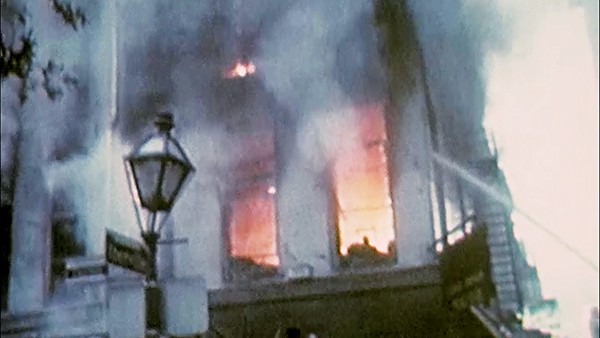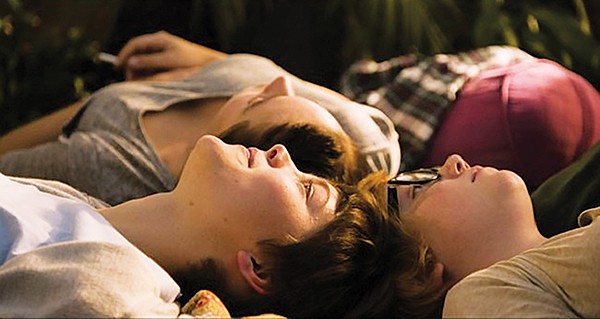The 19th year of the Outflix Film Festival finds it at a crossroads. Outgoing director Jeffrey Harwood thinks it’s a good place to be. “I’ve been working with Outflix since 2008,” and serving as director for two years, he says. “It really has been a learning experience for me, seeing the crowds get bigger and the movies change. The quality of the films we have has changed. They’ve gotten better.”
Harwood says queer cinema worldwide has expanded both in scope and subject matter. This year’s Outflix features works from Sweden, Germany, Chile, Argentina, the U.K., Ireland, France, and India. Subject matter has expanded from coming out stories and campy comedies to stories that encompass every aspect of life. “We’re seeing universal issues approached in LGBT terms — family issues, adoptions. These films aren’t all just about being gay, but because these characters are gay, it influences how they approach life. I think that’s one of the good ways that LGBT cinema is growing. We still have the campy comedies and the coming out stories, and we need them, because there are still people coming out — especially in the ‘flyover zone.’ People still need these stories, but for the rest of the community, we’re seeing ourselves reflected in far more and different ways than we were even five years ago,” Harwood says.
The opening night film is Girls Lost, directed by Alexandra-Therese Keining. It’s the story of a trio of teenage outcasts who find a magic flower that turns them into boys. Once gender switched, they find attitudes toward them have changed dramatically. “The movie speaks to transgender issues and misogyny. They find that as boys, they are completely accepted. One of the girls discovers that the reason that she never felt at home [as a girl] is because this is who she is. She is trans.”
Friday evening’s programming features films aimed at young people. In Henry Gamble’s Birthday Party, “A 17-year-old preacher’s kid is having a swim party for his birthday. One of his friends named Logan is attracted to him, and Henry is attracted to another guy who is not out yet. It examines the role of not just homosexuality, but sexuality and gender in role types. There are people at the party who are at various points on the spectrum of acceptance,” Harwood says.
Harwood is leaving Memphis to go to graduate school in Ohio, so this will be his last year as director. “We are going to be having a town hall on Sunday. We’ll fill the cinema at Ridgeway. This is an opportunity for a talkback, for the public to say what they like about Outflix, and what they would like to see changed … We want to talk about where we want to take Outflix, because next year is our 20th anniversary. So where does it need to go? How does it need to grow? … LGBT film festivals are still needed, because it’s an opportunity for us to come together in one place and an opportunity to educate the community. Here we are, we’re a part of Memphis, but you don’t know who we are. Come watch our films, and learn a little bit about us.”
Check It
Friday, September 9, 9:25 p.m.
It’s an old TV trope — Kid gets bullied. Dad tells kid to fight back. Next time kid gets bullied, kid fights back. Bullies back off.
But for many of the LGBTQ youth in a Washington, D.C.-based street gang called Check It, there was no dad to offer encouragement. And for many, there was no mom either because mom was off getting high on crack or too busy calling her son or daughter a “faggy-ass bitch” to care what was happening at school.
That’s what happened to Alton, a young, slim, African-American transgender woman with long, dark hair and a penchant for Jackie O-style sunglasses. Alton’s mom called her a “faggy-ass bitch” too many times, so Alton pushed her mother down a flight of stairs and was then sent to what she describes as a “mental home.” Then Alton found a new family in Check It.
The gang, whose members carry brass knuckles and knives and are known around D.C. for not taking any shit, is the subject of Check It, a documentary that follows the lives of a few of the gang’s members and their efforts to make positive changes in their lives.
Check It was formed in 2005 by three gay ninth-graders who were tired of being bullied. They started fighting back, and their bullies backed off. Eventually, the gang of mostly black teens and young adults grew to more than 200 members.
While the idea of a homophobia-fighting street gang sounds largely positive, the documentary makes clear that Check It often resorts to illegal activity for both defense and survival. Many of its transgender members, like Alton, are also sex workers on D.C.’s infamous K Street because it’s the only way they can find work.
Others are just really into fighting. A gay man named Skittles, who has a cross tattoo under his eye and multiple piercings on his face, tells the camera that once he starts fighting, he doesn’t stop until the cops pull him off someone.
A D.C.-area gang counselor named Ron “Mo” Moten comes along and tries to help a few Check It members get out of the gang life. He enrolls Alton and several others in a summer fashion camp, and he gets Skittles hooked up with a boxing coach.
Mo’s results are mixed, and, as the members either embrace or reject the new positive outlets, the film showcases how these youth have been set up for failure. To succeed, they have to fight not only their bullies but also their own demons developed through years of parental neglect and societal oppression. — Bianca Phillips

Upstairs Inferno

Girls Lost
Upstairs Inferno
Sunday, Sept. 7, 5 p.m.
To hear its former patrons tell it, the Up Stairs Lounge was pretty tame for a New Orleans gay bar in the early 1970s. Piano Dave would regularly entertain the patrons, and beer busts would end with folks in a circle holding hands and singing. “It was more like a social club than a bar,” says Stewart Butler in Upstairs Inferno, Outflix 2016’s closing night documentary.
The bar’s back room featured a small stage that was usually used for drag shows the regulars called “Nellydramas.” On Sunday nights, as the beer busts raged in the front room, it was transformed into the Metropolitan Community Church (MCC). It was on one of those Sunday nights, June 24, 1973, that the Up Stairs Lounge passed into infamy. Someone emptied a can of lighter fluid in the stairwell and started a fire that claimed the lives of 32 gay men. It was a tragedy, a crime, and a wake-up call for the Southern city’s gay community.
Upstairs Inferno is director Robert L. Camina’s second documentary after 2012’s Raid of the Rainbow Lounge. The story of the Up Stairs arson has so many facets: A homosexual community on the cusp of liberation in the Stonewall era, the perilous position of LGBT-friendly Christianity, and a mystery that leads to uncomfortable answers. Camina chooses not to focus on the whodunit aspects of the story but spends his time immersed in the survivors’ emotional aftermath. He tracks down the survivors of the atrocity and their allies and people who candidly recall their own discomfort at the fact that the crime made the homosexual community impossible to ignore. The interviews are powerful and harrowing, especially with Rev. Elder Troy Perry, an MCC pastor who fought for recognition of the victim’s basic humanity while the police dithered and the city’s mayor, chief of police, and archbishop ignored the carnage. “God does not hate us,” he told his grieving flock. “This is mass murder. Some human did this, not God.” — Chris McCoy